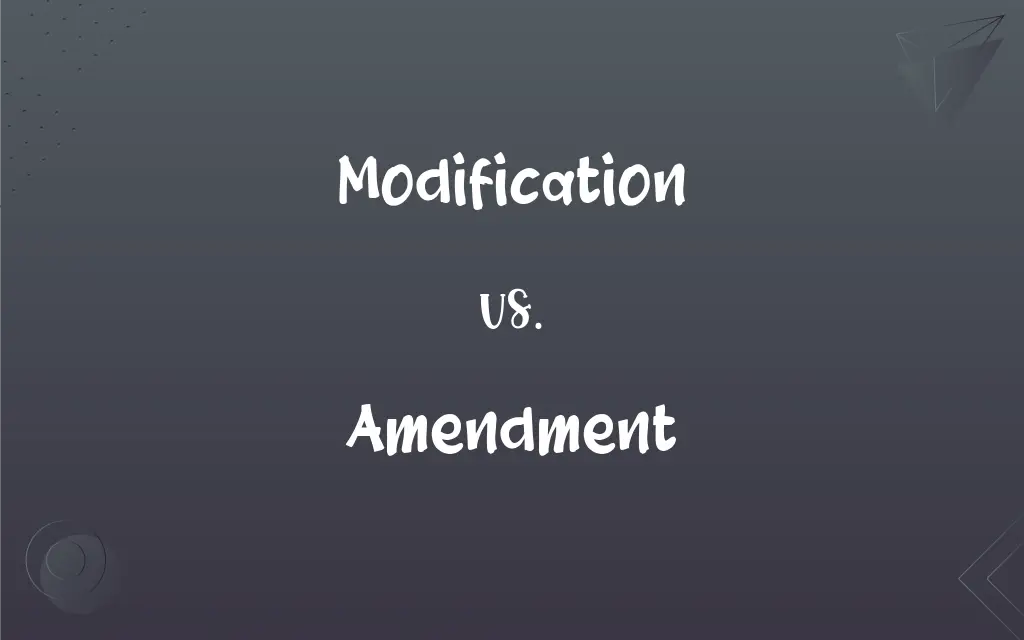Modification vs. Amendment: What's the Difference?
Edited by Harlon Moss || By Janet White || Updated on October 27, 2023
"Modification" refers to a change or alteration made to something, while "Amendment" specifically denotes a formal revision or addition to a document or law.

Key Differences
"Modification" and "Amendment" are two terms commonly encountered when discussing changes, albeit in varying contexts. "Modification" broadly pertains to making alterations or adjustments to something, allowing for adaptability or improvement. On the flip side, "Amendment" is narrower in its scope, typically referring to a formal alteration or addition to a written document, particularly in legal, constitutional, or legislative contexts.
In many instances, the act of making a "Modification" might be rooted in practical or functional considerations. For instance, a modification in a machine's design could enhance its performance. Conversely, an "Amendment", especially in legal parlance, symbolizes a revision that strengthens, clarifies, or updates the provisions of a document. One might think of the amendments to the U.S. Constitution, which explicitly define or alter specific rights and provisions.
Yet, it's worth noting that "Modification" carries flexibility. The term can be employed in diverse scenarios ranging from minor tweaks in a design to major structural changes. An "Amendment", in contrast, often emerges from deliberate and comprehensive review processes, especially when modifying foundational texts or laws, ensuring that changes made are well-thought-out and justifiable.
While both "Modification" and "Amendment" intrinsically connote change, the gravity and formalism associated with them can differ. A modification can be more fluid, possibly even temporary, catering to evolving needs. However, an amendment, especially when tied to laws or foundational texts, holds a weight of permanence, reflecting collective agreement and long-term intent.
At their core, both "Modification" and "Amendment" serve to refine, improve, or adapt based on evolving understanding, needs, or challenges. But, distinguishing between them offers clarity, as "Modification" leans more towards general alterations, while "Amendment" underscores formal, often institutionalized, changes.
ADVERTISEMENT
Comparison Chart
Definition
A change or alteration
A formal revision or addition
Context
General, varied contexts
Legal, constitutional, legislative
Flexibility
More fluid and adaptable
Often more permanent and deliberate
Intention
Practical or functional considerations
Clarify, update, or strengthen provisions
Process
Can be informal or formal
Usually involves a structured review process
ADVERTISEMENT
Modification and Amendment Definitions
Modification
An adjustment to a method or system.
The company implemented a modification in its hiring process.
Amendment
A formal change or addition to a document or law.
The Bill of Rights consists of the first ten amendments to the U.S. Constitution.
Modification
A change to improve or make suitable.
The building had a modification to ensure accessibility.
Amendment
The act of revising or altering (especially in law).
The senator proposed an amendment to the tax bill.
Modification
A variation of an original form.
The artist's modification of the piece gave it a modern touch.
Amendment
A correction or improvement to a text.
The author made an amendment to the manuscript based on feedback.
Modification
The act or process of modifying or the condition of being modified.
Amendment
An addition that reflects a developing change in thought.
The policy saw an amendment to include recent insights.
Modification
A change or a result produced by modifying
New modifications in the car's design.
Amendment
A modification to a motion or legislation.
The committee accepted the amendment after much debate.
Modification
A change undergone by a word that is borrowed from another language.
Amendment
The act of changing for the better; improvement
"Society may sometimes show signs of repentance and amendment" (George G. Coulton).
Modification
A phonological change undergone by a word or morpheme when it is used in a construction, as the change of will to 'll in they'll.
Amendment
A correction or alteration, as in a manuscript.
Modification
The form of existence belonging to a particular object, entity etc.; a mode of being.
Amendment
The process of formally altering or adding to a document or record.
Modification
(linguistics) the change undergone by a word when used in a construction (for instance am => 'm in I'm)
Amendment
A statement of such an alteration or addition.
Modification
The result of modifying something; a new or changed form.
Amendment
Amendment One of the provisions in the US Constitution protecting individual rights.
Modification
The act of making a change to something while keeping its essential character intact; an alteration or adjustment.
Behavior modification officer
Amendment
A material, such as organic matter or sand, mixed into soil to improve growing conditions.
Modification
(biology) A change to an organism as a result of its environment that is not transmissable to offspring.
Amendment
An alteration or change for the better; correction of a fault or of faults; reformation of life by quitting vices.
Modification
(linguistics) a change to a word when it is borrowed by another language
Amendment
In public bodies, any alteration made or proposed to be made in a bill or motion that adds, changes, substitutes, or omits.
Modification
The act of modifying, or the state of being modified; a change; as, the modification of an opinion, or of a machine.
Amendment
(legal) Correction of an error in a writ or process.
Modification
Something which has been modified; a modified form or condition; state as modified; as, the various modifications of light; the latest modification of the operating system crashes less frequently.
Amendment
An addition to and/or alteration to the Constitution.
The First Amendment guarantees freedom of religion, speech, press, assembly, and petition.
The Thirteenth Amendment to the United States Constitution abolished slavery.
Modification
The alteration of the meaning of a word or phrase by another word or phrase; - usually a restriction of the scope of the word modified; as, in the phrase "a billion dollars is a relatively small sum to spend on cancer research" the modification of small by relatively is needed to make the sentence accurate, rather than ludicrous.
Amendment
That which is added; that which is used to increase or supplement something.
A soil amendment
Modification
The act of making something different (as e.g. the size of a garment)
Amendment
An alteration or change for the better; correction of a fault or of faults; reformation of life by quitting vices.
Modification
Slightly modified copy; not an exact copy;
A modification of last year's model
Amendment
In public bodies; Any alternation made or proposed to be made in a bill or motion by adding, changing, substituting, or omitting.
Modification
The grammatical relation that exists when a word qualifies the meaning of the phrase
Amendment
Correction of an error in a writ or process.
Modification
An event that occurs when something passes from one state or phase to another;
The change was intended to increase sales
This storm is certainly a change for the worse
The neighborhood had undergone few modifications since his last visit years ago
Amendment
The act of amending or correcting
Modification
An alteration or adjustment to something.
The car underwent a modification to enhance its speed.
Amendment
A statement that is added to or revises or improves a proposal or document (a bill or constitution etc.)
Modification
The act of making something different.
The software received a modification to fix the bugs.
FAQs
In what context is "Amendment" most commonly used?
"Amendment" is most often used in legal, constitutional, or legislative contexts.
Can any document be amended?
In principle, yes, but an "Amendment" typically refers to formal revisions in legal or foundational documents.
Can a product design undergo a "Modification"?
Yes, product designs often undergo modifications for improvement or adaptability.
Which term implies a stronger change: "Modification" or "Amendment"?
Both imply change, but "Amendment" often carries a weight of formalism and permanence.
Do all "Amendments" require approval?
Typically, especially in legal contexts, "Amendments" require approval by relevant stakeholders.
Is every "Amendment" a "Modification"?
Yes, every "Amendment" is a type of "Modification", but not every "Modification" is an "Amendment".
Can a "Modification" be temporary?
Yes, a "Modification" can be temporary, whereas an "Amendment" often implies a more permanent change.
Is a "Modification" in a rental agreement the same as an "Amendment"?
A "Modification" is a change, but an "Amendment" would be a formal, documented change agreed upon by all parties.
Is a "Modification" always formal?
No, a "Modification" can be either informal or formal, whereas an "Amendment" is usually formal.
How are "Amendments" to the U.S. Constitution made?
Amendments require proposal by a two-thirds majority in both houses of Congress or a convention, followed by ratification by three-fourths of the states.
Do "Modifications" always improve something?
Not necessarily. "Modifications" are changes, and their efficacy can be subjective.
Is an "Amendment" always an addition?
No, an "Amendment" can also remove or replace portions of a document.
How is a "Modification" different in a scientific context?
In science, a "Modification" might refer to changes in an experiment, design, or hypothesis based on observations.
Why might a company seek a "Modification" in its operations?
To adapt to market changes, improve efficiency, or meet evolving objectives.
Can laws be "Modified" without an "Amendment"?
Interpretation of laws can evolve, but formal changes typically require an "Amendment".
Can a software undergo a "Modification"?
Yes, software frequently undergoes modifications to add features, fix bugs, or improve performance.
What’s a common "Modification" in cars?
Common car modifications include engine tuning, suspension changes, or aesthetic alterations.
Is it easier to make a "Modification" or an "Amendment"?
Generally, a "Modification" is broader and can be more easily made, while an "Amendment" often requires a structured review and approval process.
What drives the need for an "Amendment" in a law?
Evolving societal values, unforeseen challenges, or the need for clarification can drive amendments.
Are all "Amendments" improvements?
Not necessarily. The effectiveness of an "Amendment" can be subjective and depends on its intent and implementation.
About Author
Written by
Janet WhiteJanet White has been an esteemed writer and blogger for Difference Wiki. Holding a Master's degree in Science and Medical Journalism from the prestigious Boston University, she has consistently demonstrated her expertise and passion for her field. When she's not immersed in her work, Janet relishes her time exercising, delving into a good book, and cherishing moments with friends and family.
Edited by
Harlon MossHarlon is a seasoned quality moderator and accomplished content writer for Difference Wiki. An alumnus of the prestigious University of California, he earned his degree in Computer Science. Leveraging his academic background, Harlon brings a meticulous and informed perspective to his work, ensuring content accuracy and excellence.






































































